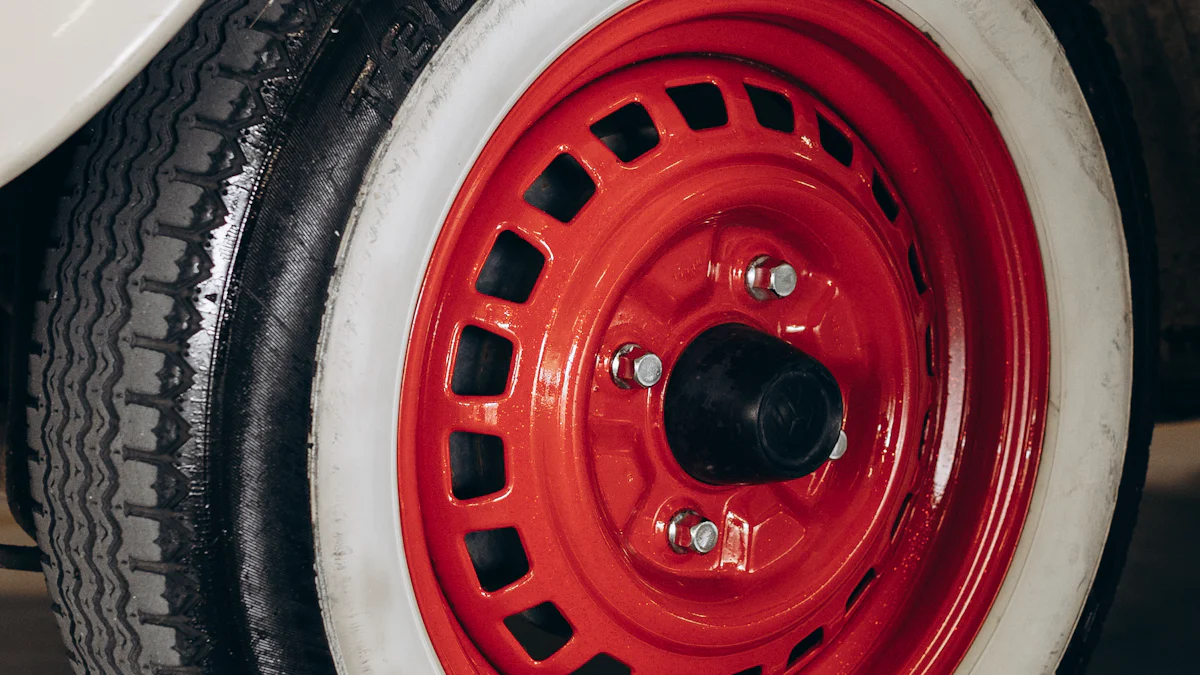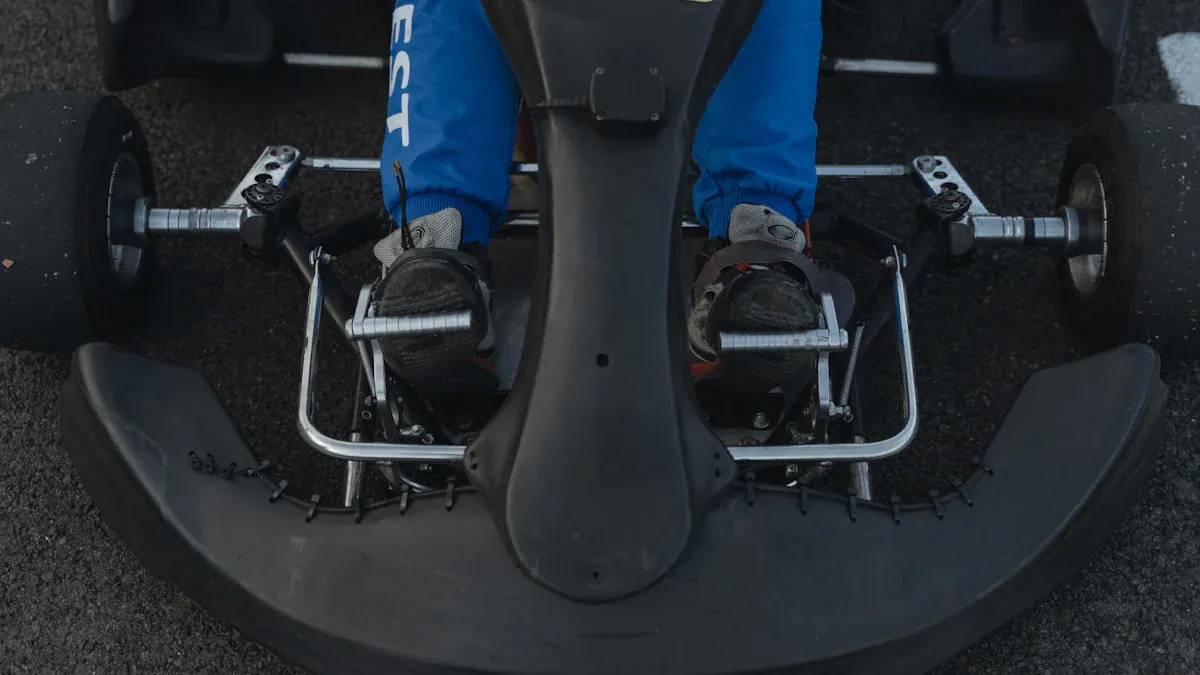
Car steel wheels have played a transformative role in the evolution of cars, shaping their performance and reliability. Their unmatched strength and durability revolutionized vehicle safety, especially in challenging terrains. Early innovations, such as the introduction of steel-spoke wheels in the 1920s, replaced wooden designs, offering greater resilience. Over time, advancements in metallurgy and manufacturing made steel wheels cost-effective and easy to repair. These qualities ensured their widespread adoption, making them a cornerstone of mass vehicle production. Even today, the car steel wheel remains a practical and dependable choice for many applications.
The Early Evolution of Automotive Wheels

Transition from Wooden to Steel Wheels
The evolution of automotive wheels began with wooden designs, which were common in early vehicles. These wheels, while lightweight, lacked the strength needed to support the increasing speed and weight of cars. As automobiles advanced, the demand for more durable and reliable wheels grew. Steel wheels emerged as the solution, offering unmatched strength and resilience. Unlike wooden or wire wheels, steel wheels could withstand the stress of heavier vehicles and rough terrains. This transition marked a significant improvement in the performance and reliability of early automobile wheels.
Steel wheels also addressed the limitations of previous designs. Wooden wheels often cracked under pressure, while wire wheels required frequent maintenance. The introduction of steel wheels reduced these issues, making vehicles more dependable. This shift not only enhanced safety but also lowered costs, making cars more accessible to a broader audience. The transition from wooden to steel wheels played a pivotal role in the evolution of automotive wheels, setting the stage for further advancements.
The First Car Steel Wheels and Their Adoption
The adoption of steel wheels in early automobiles revolutionized the industry. Manufacturers recognized the benefits of steel wheels, including their ability to handle unpaved roads and challenging terrains. Early models equipped with steel wheels demonstrated improved durability and performance. These wheels allowed cars to travel longer distances without the frequent repairs required by wooden or wire wheels.
Despite their advantages, the transition to steel wheels was not without challenges. Early manufacturers faced difficulties in producing steel wheels at scale. However, advancements in metallurgy and manufacturing techniques soon resolved these issues. As production methods improved, steel wheels became more affordable and widely available. This development made them a standard feature in many early automobiles, solidifying their place in automotive history.
The introduction of the car steel wheel marked a turning point in the evolution of automotive wheels. It addressed the limitations of earlier designs and paved the way for the mass production of reliable and cost-effective vehicles.
The Rise of Steel Wheels in the Automotive Industry
Durability and Safety as Key Drivers
Steel wheels became a cornerstone of the automotive industry due to their unmatched durability and safety. Early automobiles often traveled on unpaved roads, where wooden and wire wheels struggled to endure the harsh conditions. Steel wheels, however, offered greater strength and resilience. Their ability to withstand rough terrains and heavy loads made them ideal for both passenger and commercial vehicles. Unlike their predecessors, steel wheels resisted bending or cracking upon impact, ensuring reliability even in challenging environments.
The robust nature of steel wheels also contributed to improved vehicle safety. Their resistance to damage reduced the likelihood of sudden failures, which could endanger drivers and passengers. This reliability made steel wheels a preferred choice for heavy-duty applications, where safety was paramount. Additionally, their longer lifespan under stress minimized the need for frequent replacements, further enhancing their appeal. By addressing the limitations of earlier designs, steel wheels played a pivotal role in the evolution of automotive wheels, setting new standards for durability and safety.
Cost-Effectiveness and Mass Production
The rise of steel wheels in the automotive industry was also driven by their cost-effectiveness. Steel, as a material, was more affordable than alternatives like aluminum or magnesium. This affordability made steel wheels accessible to a broader audience, contributing to the mass production of cars. Manufacturers could produce steel wheels at scale without compromising quality, which helped reduce the overall cost of vehicles.
Advancements in manufacturing techniques further boosted the appeal of steel wheels. Processes like stamping and welding allowed for efficient production, while innovations in metallurgy improved the strength and performance of the wheels. These developments enabled manufacturers to meet the growing demand for reliable and affordable car wheels. Simplified repairs also reduced maintenance expenses for vehicle owners, making steel wheels a practical choice for everyday use.
The combination of durability, safety, and cost-effectiveness cemented the steel wheel’s place in automotive history. Its role in advancing automotive technology and making cars more accessible cannot be overstated.
Advancements in Steel Wheel Design

Innovations in Materials and Manufacturing
The evolution of automotive wheels has seen remarkable advancements in materials and manufacturing processes. Modern car steel wheel designs benefit from the use of high-strength low-alloy (HSLA) steels. These materials improve durability while reducing weight, making vehicles more efficient. Heat treatment processes, such as quenching and tempering, enhance the hardness and wear resistance of steel wheels, ensuring they withstand challenging conditions.
Manufacturing processes have also undergone significant improvements. Advanced control of rolling, forging, and extrusion techniques has resulted in better mechanical properties. Non-conventional methods, like powder metallurgical forging, have shortened production cycles, increasing efficiency. Automation in production lines has further improved consistency and reduced errors, ensuring high-quality steel wheels for automotive applications.
Sustainability has become a key focus in manufacturing. The use of recycled steel and advanced coatings for corrosion protection has minimized environmental impact. These innovations not only enhance the performance of steel wheels but also align with modern automotive technology trends, emphasizing eco-friendliness and efficiency.
Aesthetic and Functional Enhancements
Steel wheels have evolved beyond functionality to incorporate aesthetic and functional improvements. Modern designs feature sleek and stylish patterns, enhancing the visual appeal of cars. Streamlined shapes reduce air resistance, contributing to better fuel efficiency. These functional enhancements make steel wheels a practical choice for both performance and economy.
Customization options have also gained popularity. Consumers can choose from various finishes and colors to match their preferences. This flexibility allows manufacturers to cater to diverse tastes while maintaining the durability and reliability of steel wheels.
| Aspect | Description |
|---|---|
| Aesthetic Appeal | Modern designs incorporate sleek and stylish patterns, enhancing visual appeal. |
| Functional Design | Streamlined shapes reduce air resistance, contributing to fuel efficiency. |
| Customization Options | Different finishes and colors cater to consumer preferences. |
These advancements in design have ensured that steel wheels remain relevant in the automotive industry. By combining durability with style and efficiency, they continue to play a vital role in the evolution of automotive wheels.
Steel Wheels vs. Alloy Wheels
Strengths and Limitations of Steel Wheels
Steel wheels offer several advantages that make them a reliable choice for many vehicles. Their durability stands out as a key strength. Steel wheels resist bending or cracking even under significant impact, making them ideal for rugged terrains and harsh driving conditions. This strength ensures they perform well in winter or on powerful vehicles. Additionally, steel wheels are cost-effective due to their lower material costs and simpler manufacturing processes. Replacing a steel wheel is also more affordable compared to alloy alternatives.
However, steel wheels have limitations that affect their performance in certain scenarios. Their increased weight, due to the density of steel, can reduce fuel efficiency and place additional strain on vehicle components. This added weight may also impact handling, especially in high-performance cars. Furthermore, steel wheels lack the aesthetic appeal and customization options that many consumers seek. These factors have contributed to the rise of alternative materials in car wheel design.
Why Alloy Wheels Became a Popular Alternative
Alloy wheels have gained popularity in the automotive industry due to their lightweight and performance-enhancing properties. Made from a combination of aluminum or magnesium with other metals, alloy wheels reduce unsprung weight, improving handling and fuel efficiency. This weight reduction also enhances shock absorption, leading to a smoother ride.
Alloy wheels offer additional benefits that appeal to modern consumers. Their resistance to corrosion ensures a longer lifespan, especially in regions with harsh weather conditions. Advanced manufacturing techniques allow for dynamic shapes and designs, providing greater aesthetic flexibility. Consumers can choose from a variety of styles, making alloy wheels a preferred choice for those seeking visual appeal. Moreover, alloy wheels improve brake heat dissipation, which enhances performance during demanding driving conditions.
While steel wheels remain a practical and durable option, alloy wheels have become a popular alternative due to their lightweight construction, improved performance, and design versatility. This shift reflects the evolving priorities in automotive technology and consumer preferences.
The Future of Steel Wheels in Modern Automotive Trends
Role in Electric and Autonomous Vehicles
Steel wheels are adapting to meet the demands of electric and autonomous vehicles. These vehicles require components that balance strength, weight, and efficiency. Modern steel wheels, made from high-strength low-alloy steels, offer the durability needed to support the heavy batteries of electric cars. Their ability to handle high loads ensures safety and reliability in these advanced vehicles.
Autonomous vehicles rely on precise engineering for optimal performance. Steel wheels, with their consistent quality and structural integrity, provide the stability required for self-driving systems. Manufacturers are also exploring lightweight steel wheel designs to improve energy efficiency. By reducing weight, these wheels help extend the range of electric vehicles, making them more practical for everyday use.
The affordability of steel wheels further supports their role in the future of automotive technology. As electric and autonomous vehicles become more common, cost-effective solutions like steel wheels will play a crucial role in making these innovations accessible to a wider audience.
Sustainability and Recycling in Steel Wheel Production
Sustainability is becoming a priority in steel wheel production. Manufacturers are adopting eco-friendly practices to reduce environmental impact. Steel wheels are a sustainable alternative to aluminum wheels due to their lower energy requirements during production and simpler recycling processes.
“Steel wheel production is around six times more energy-efficient than aluminum,” says Duning. “The recycling is also simpler and less energy-intensive. If we are serious about sustainability, then we must also make steel wheels a more attractive option for customers.”
Several advancements are driving sustainability in steel wheel manufacturing:
- Development of lightweight steel wheels that lower carbon emissions.
- Use of ultra-low CO2 steel and energy-efficient manufacturing processes.
- Increased use of recycled steel to minimize waste.
These innovations align with the automotive industry’s shift toward greener technologies. By focusing on sustainability, steel wheels remain a viable and eco-conscious choice for modern vehicles.
Steel wheels have left an indelible mark on car history, evolving from wooden-spoke designs to modern high-strength alloys. Key milestones, such as the introduction of steel-spoke wheels in the 1920s and stamped steel wheels in the 1930s, revolutionized automotive durability and cost-efficiency. These advancements enabled vehicles to endure rough terrains and heavy loads, setting new standards for reliability.
Today, steel wheels remain essential in the automotive industry. Their durability and cost-effectiveness make them a preferred choice for entry-level vehicles, commercial applications, and winter tire setups. Their energy-efficient production and simple recycling processes align with growing sustainability demands, ensuring their relevance in modern markets.
Looking ahead, steel wheels are poised to play a pivotal role in future automotive innovations. Lightweight designs and ultra-low CO2 steel manufacturing processes will enhance performance while reducing environmental impact. Aesthetic enhancements and customization options will cater to evolving consumer preferences. As the industry embraces electric and autonomous vehicles, steel wheels will continue to adapt, balancing strength, efficiency, and sustainability.
FAQ
What makes steel wheels more durable than alloy wheels?
Steel wheels use high-strength materials that resist bending and cracking under heavy loads or impacts. Their robust construction ensures reliability in harsh conditions, such as off-road terrains or winter weather. This durability makes them ideal for commercial vehicles and rugged applications.
Are steel wheels suitable for electric vehicles?
Yes, steel wheels support the heavy batteries of electric vehicles due to their strength. Manufacturers now design lightweight steel wheels to improve energy efficiency, helping extend the range of electric cars. Their cost-effectiveness also aligns with the affordability goals of electric vehicle production.
How are steel wheels manufactured?
Steel wheels are produced using processes like stamping, welding, and heat treatment. These methods enhance their strength and durability. Modern factories use automation and advanced techniques, such as powder metallurgical forging, to ensure consistent quality and efficient production.
Why are steel wheels more affordable than alloy wheels?
Steel wheels use less expensive materials and simpler manufacturing processes. Their production involves fewer steps compared to alloy wheels, reducing costs. Additionally, repairs and replacements for steel wheels are more economical, making them a budget-friendly option for many drivers.
Can steel wheels be recycled?
Yes, steel wheels are highly recyclable. Their production requires less energy compared to aluminum wheels, and recycling steel is simpler and more efficient. This eco-friendly aspect makes steel wheels a sustainable choice in the automotive industry.
- Posted In:General






